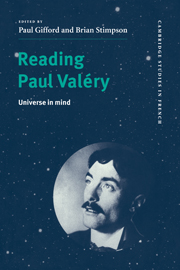Book contents
- Frontmatter
- Contents
- Contributors
- Abbreviations
- Introduction
- PART 1 SELF-SCIENCE
- 1 Towards a biography of the mind
- 2 Thinking-writing games of the Cahiers
- 3 Paradigms of the self: Valéry's mythical models
- 4 The fascination of science
- 5 An art of rethinking: Valéry's ‘negative philosophy’
- PART 2 SELF-WRITINGS
- PART 3 BODY, MIND, WORLD
- Conclusion
- Bibliography
- Index
- Cambridge Cultural Social Studies
1 - Towards a biography of the mind
Published online by Cambridge University Press: 04 August 2010
- Frontmatter
- Contents
- Contributors
- Abbreviations
- Introduction
- PART 1 SELF-SCIENCE
- 1 Towards a biography of the mind
- 2 Thinking-writing games of the Cahiers
- 3 Paradigms of the self: Valéry's mythical models
- 4 The fascination of science
- 5 An art of rethinking: Valéry's ‘negative philosophy’
- PART 2 SELF-WRITINGS
- PART 3 BODY, MIND, WORLD
- Conclusion
- Bibliography
- Index
- Cambridge Cultural Social Studies
Summary
How can one conceive of a ‘Valéryan biography’? A biography, that is, which would remain faithful to a writer who unceasingly proclaimed: ‘il m’ ennuyerait trop d'écrire ce que je vis d'oublier’ (‘it would excessively bore me to write down what I live by forgetting’) (C, xxiii, p. 8) and who systematically doubted the authenuicity and usefulness of any such enquiry, whether in respect of himself or others?
We may recall the scenes in Mon Faust (1942) where Faust is observed dictating the ‘Mémoires de Moi’. In the dancing play of parodic irony, Valéry offers a virtuoso exhibition of the pretentions and pretences of a whole autobiographical tradition, from Rousseau to Stendhal and Gide. Everywhere, he shows the impure contrivances of confession and ‘sincerity’: ‘ce puissant effet ne s'obtient qu'en se chargeant soi-même de toutes les horreurs, ignominies intimes ou expériences exécrables – vraies ou fausses – dont un homme puisse s'être avisé' (Œ, ii, p. 286). To write one's life is to consent to the rule of appearances; it means peddling mythical images which, derisorily, fail to conceal the real ignorance and autographical incompetence of the subject. Taking the measure of a self's elusive authenticity, should one not perhaps label as purely and simply imaginary or fictional any enterprise which yields to the temptation of (auto)biography? ‘Je vous ai dit et redit que ces mémoires ne sont pas des souvenirs, et que je tiens ce que j imagine pour aussi digne d'être moi que ce qui fut, et dont je doute …’ (Œ, ii, P. 331).
- Type
- Chapter
- Information
- Reading Paul ValéryUniverse in Mind, pp. 17 - 35Publisher: Cambridge University PressPrint publication year: 1999

